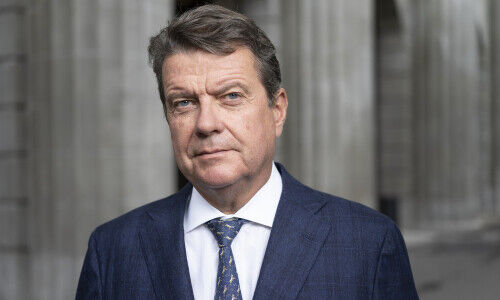UBS to Receive the Supervision It Deserves
Finma's future director grew up in the US and has extensive experience regulating Wall Street and major European banks. He has few illusions about their ability to avoid crises, making him an ideal fit to watch over the new UBS.
Stefan Walter (image below) already knew in June that he would turn his back on the European Central Bank (ECB). That was well before Urban Angehrn took the unusual step of announcing his surprising resignation as the Swiss Financial Market Supervisory Authority (Finma) director by the end of 2023 − on LinkedIn of all places.
Banking Expert

(Image: ECB)
In the meantime, that post seems to have disappeared or been deleted. By contrast, the versed banking supervisor, a German citizen, will soon have another notch that he can stick on his CV. On Wednesday, he will be the regulator's new director effective April 1.
Walter is a deeply ingrained bank specialist who has had a bird eye's view of every single financial crisis since the 1990s. He succeeds Angehrn, an insurance specialist, who left following the heavy burden imposed by Credit Suisse's rescue.
Fed Dream Job
The career of the 59-year-old started at the Federal Reserve (Fed) Bank of New York. The choice was an intentional one. Walter, who had been born in Germany, grew up in San Diego where his father taught at university. He completed his secondary education in Germany but then decided to return to Berkeley to complete his banking and financial studies in the US.
That must have seemed like a dream job to him. The Fed was not in a position to be able to stop the subprime crisis from happening, and it almost took the entire global financial system down with it in 2008.
Needed Reforms
But Walter had already moved on by then. Between 2006 and 2011, he was the Secretary-General for the Bank for International Settlements (BIS), where he was responsible for coordinating the international negotiations for the much-needed Basel III reforms during the financial crisis.
He was also there to see the new regulations being stamped out that the Swiss «too big to fail» rules were subsequently derived from.
«Uncomfortably High»
He has no illusions about how susceptible the banking sector is to crisis, as a 2011 speech on Basel III at the Financial Stability Institute indicates. «The costs of banking crises are extremely high but, unfortunately, the frequency has been as well. Since 1985, there have been over 30 banking crises in Basel Committee-member countries. Roughly, this corresponds to a 5% probability of a Basel Committee member country facing a crisis in any given year – a one in 20 chance, which is unacceptably high,» he told the audience.
In fact, Switzerland, one of those member countries, has had a banking crisis about once every 15 years. The mortgage crisis of the 1990s was followed by UBS's rescue at taxpayer expense in 2008. That was followed by Credit Suisse's rescue in March 2023 which required billions in government-backed guarantees.
Jumping In
Restructuring Credit Suisse had been kept as an option until the last moment before a decision was made to get UBS to rescue the bank. That was because overseas regulators had seen the former alternative as too risky.
UBS had to jump in and stabilize the situation, something it managed to do with the help of the government, Finma, and the Swiss National Bank (SNB). The «too big to fail» rules that Walter had helped herd into force now have something of an aftertaste of not being up to the task during an actual crisis.
Painful Steps
As finews.asia recently analyzed, there will be no so-called Plan B in the future. There is no Swiss bank large enough out there to save the new UBS. Any government guarantees or injections of liquidity such as the public liquidity backstop that shored up the situation last March could quickly bring the country to its limits.
The only option would be a very painful restructuring and there is no person better placed for that than Walter, who created and implemented the basic framework of regulation at the ECB that major European banks have to follow.
Sharper Instruments

(Image: Keystone)
The designated future director of Finma doesn't only hold exchanges with overseas regulators. He has spent his career working at them, something that should prove to be an appreciable advantage for the long-term security of the Swiss financial sector.
He is used to having an entirely different relationship with both the ECB and the Fed. Given that, he is a logical choice for helping Finma implement sharper instruments, including the ability to discipline, fine, and communicate openly and transparently about offending institutions and individuals.
Walter is also not averse to making bankers sweat. He has worked on and conducted stress tests at the ECB for Europe's largest banks.
Wall Street Cynicism
That should put him at eye level with UBS chairman Colm Kelleher (image above). The meeting between the two is sure to be an interesting one. Both know and understand Wall Street's culture deeply and have experienced the peaks and troughs of the largest Western banks in the world firsthand.
While it is generally understood that Kelleher has an affinity for jokes and playing practical tricks on members of staff, Walter has a more typical type of categorical American cynicism, as a reporter of Germany's «WirtschaftsWoche» once wrote. When asked a question by the journalist, the former ECB banker supposedly answered: «I could tell you, but then I would have to kill you.»




























